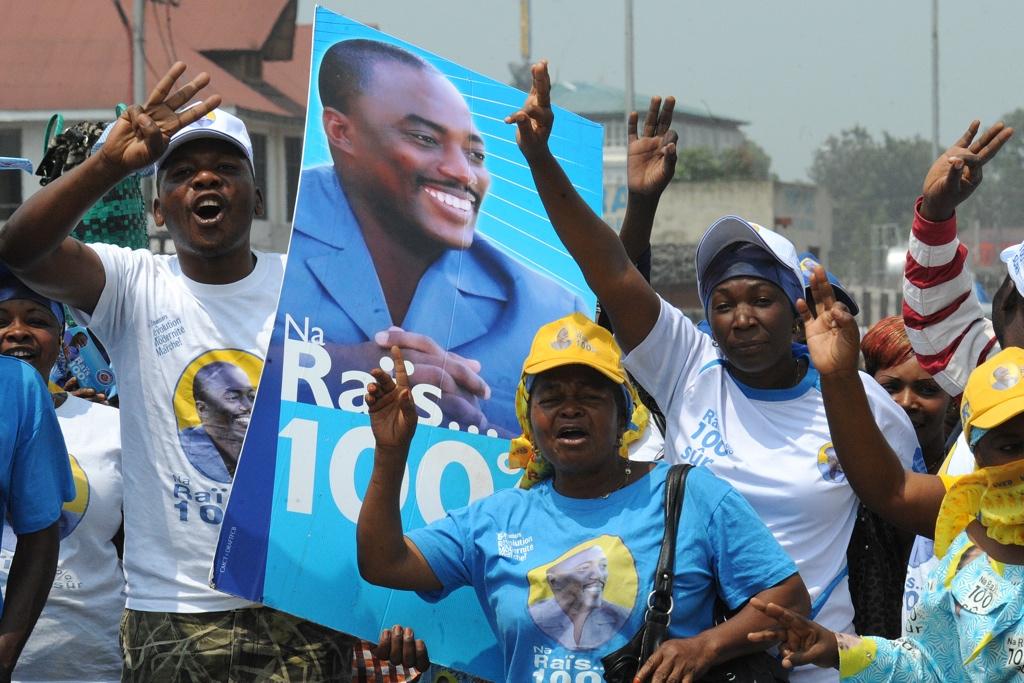Congo: Kabila celebrates win, others cry foul
Supporters of Joseph Kabila celebrate his re-election as President of the Democratic Republic of the Congo on December 10, 2011 in Goma, eastern Congo.
GOMA, Democratic Republic of Congo — In a victory celebration over the weekend, five goats were slaughtered in honor of President Joseph Kabila’s re-election, and women in dresses printed with his portrait danced on the streets.
On the edge of the celebration, a 27-year-old man in a crisp white shirt and tie eyed the revelers. Fiston Kheta, a local political activist, said the election was stolen, and the president should be arrested for the crime.
“Those results are irrelevant,” he said. “The ballot boxes were stuffed and the election was a fraud.”
Kabila’s victory was announced Friday, with the president winning 49 percent of the vote.
Opposition leader Etienne Tshisekedi, who won 32 percent of the ballot, immediately rejected the count, declaring himself the next elected president of Congo.
Not long after Tshisekedi declared victory, third-place winner Vital Kamerhe publicly congratulated his former rival, calling the official tally a “mock election.”
In the troubled eastern province of North Kivu, opposition officials said they are planning peaceful protests in support of Tshisekedi to begin this week. Nicholas Matabaro, a member of the party, said he expects soldiers and riot police to break up protests.
“The government will fight us for the same reason they stuffed the ballots,” he said in one of the party's small offices in Goma. “We are not afraid. No matter how much they shoot at us, we won’t stop until we get our rights.”
Human Rights Watch says at least 18 people were killed and 100 injured in violence leading up to the vote. Since the announcement of the results, between four and six people have been killed, according to local reports.
More from GlobalPost: Congo protests in London lead to 143 arrests
Information Minister Lambert Mende Omalanga said the government is prepared to deal “harshly” with anyone who disturbs the peace in the coming days.
International observers from the Carter Center issued a report Saturday saying the elections lacked credibility. The Carter report says some pro-Kabila districts had a 100 percent turnout with the president taking almost every vote, while vast swaths of ballots from pro-Tshisekedi areas were lost.
“These and other observations point to mismanagement of the results process and compromise the integrity of the presidential election,” states the Carter Center report.
The Carter report stops short of saying Kabila’s win was false, saying it didn’t have enough information to make that kind of assessment. Facing a divided opposition of 10 candidates in a winner-take-all race, Kabila was largely favored to win — even without the alleged widespread fraud and disorganization.
Other international organizations urged the Congolese people to accept the results of the election, even before the votes were counted. After the results were announced, United Nations Secretary-General Ban Ki-moon urged opposition parties to contest the elections in the courts, rather than the streets. The secretary-general “strongly condemns any acts of violence in connection with the electoral process.”
At the Kabila victory party here on the streets of Goma, Paul Katakala fashioned goat meat onto wooden sticks for the barbeque. He said Kabila’s win was a genuine show of support from a nation still reeling from war. In 2008, Kabila brokered a power sharing agreement that mostly settled a decade-long conflict that left millions of people dead and millions more displaced.
“We love him because he is not an extremist,” Katakala said. “He unites people from different tribes and ethnicities. The country was divided by rebellions, but he united Congo.”
Related: Volcanoes: hottest thing in Congo tourism
Behind a tin door in one of Goma’s many slums, 27-year-old Matthew Otchumbe said Kabila’s ten-year reign has been a disappointment, and that the president didn’t fulfill any of the promises he made five years ago to improve development, education, health care and security.
Like many opposition supporters, Otchumbe said the international community should intervene. And like many people in this war-torn province, he said he was afraid to demonstrate because peaceful protests could quickly turn violent and suck the nation back into war.
“People shouldn’t protest on the streets — they will be shot like birds,” he said. “We shouldn’t have riots just to be killed.”
